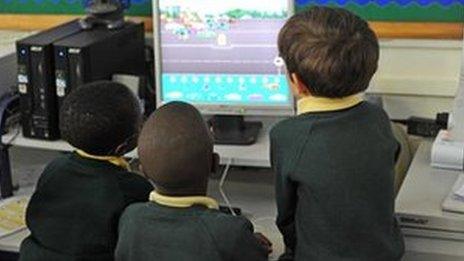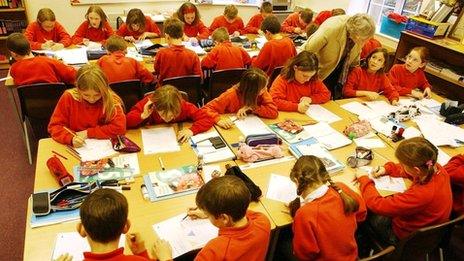New commission on primary assessment
- Published

Schools will have to work out new forms of assessment
A teacher-led commission is being set up to help primary schools in England find new ways of assessing their pupils' progress.
The previous system of levels, where pupils' progress was assessed against standards set by the national curriculum, has been scrapped.
Ministers argued this system was too "vague" and "misleading".
National tests for seven- and 11-year-olds based on the new national curriculum are also being drawn up.
The Commission on Assessment Without Levels will be led by former head teacher of the London Oratory School John McIntosh, who was also a member of the government's advisory committee on its review of the national curriculum.
Up until September 2014, schools used the national-curriculum levels to assess the progress of their pupils.
'Accurate picture'
For example, pupils were expected to reach at least Level 2 by the end of Year 2 - when they had completed Key Stage 1 or infant school.
There were also three sub-levels within each level, designed to inform teachers how close children were to reaching the level.
But some say these confused parents, and the levels have not been updated for the new national curriculum.
Instead, ministers have left it up to schools to decide what system to use.
Teaching unions have expressed concerns about schools using a range of different assessment levels and the fact that the details of the national tests for 11-year-olds - when they have completed Key Stage 2 or junior school - due to be introduced in 2016, are not yet available.
School Reform Minister Nick Gibb said: "Ensuring pupil assessment provides an accurate picture of a pupil's attainment and progress without placing a bureaucratic burden on teachers is a key part of the government's plan for education
'Genuine conversation'
"Levels have been a distracting, over-generalised label, giving misleading signals about the genuine attainment of pupils.
"Crucially they failed to give parents clarity over how their children were performing and also resulted in a lack of trust between primary and secondary schools - clogging up the education system with undependable data on pupil attainment.
"The commission announced today will help schools develop their own, more accurate assessment systems that truly show how a child is performing in the classroom."
He said levels had only ever been intended to be used to sum up a pupil's attainment and progress at the end of key stages, but many schools had used them as part of ongoing assessments.
Mr Gibb said the need for a "genuine conversation" between parents and schools had been lost sight of and that too much attention had been paid to getting children over boundaries.
"In short, levels were just too vague and imprecise," he said.
'Nuanced'
"They were misleading as to what pupils knew and could do.
"The use of levels was pushing pupils on to new material - in the name of 'pace' - when they had not adequately understood vital content and had serious gaps in their knowledge."
Dr Mary Bousted, general secretary of the Association of Teachers and Lecturers, said: "Schools have been asking for support since the government first announced that levels would be removed. So while this may be useful, we could have done with it 18 months ago.
"We do agree that levels had become unhelpful but schools are already working hard to implement new systems and approving new software, and this could just confuse matters further.
"It remains unclear the extent to which Ofsted is able to effectively inspect an assessment system that is becoming increasingly diverse and nuanced.
- Published27 March 2014

- Published13 February 2014
